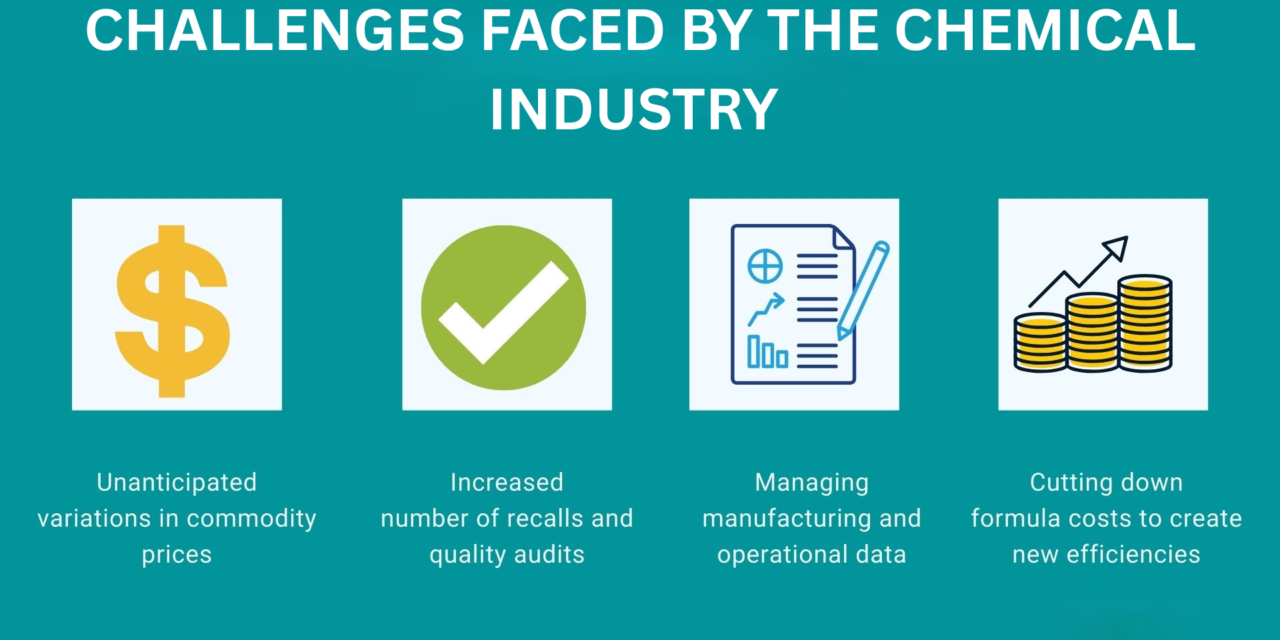The chemical industry faces a number of challenges that are complex and interconnected, ranging from environmental concerns to evolving regulations and global economic pressures. Here are the main challenges the industry is dealing with today:
1. Sustainability and Environmental Impact
- Greenhouse Gas Emissions: The chemical industry is a significant contributor to global greenhouse gas emissions, particularly in the production of petrochemicals, fertilizers, and energy-intensive processes. Reducing carbon footprints and transitioning to more sustainable practices is a major challenge.
- Waste Management and Recycling: The increasing production of plastics and other waste materials, combined with insufficient recycling infrastructure, has created a global waste crisis. The chemical industry faces pressure to develop more sustainable materials, improve recycling technologies, and manage industrial waste effectively.
- Water Usage and Pollution: Chemical plants require significant amounts of water, and improper disposal of chemical effluents can lead to water pollution, impacting ecosystems and public health. Sustainable water management and reducing water pollution are ongoing concerns.
2. Regulatory Compliance and Health & Safety
- Strict Regulations: The chemical industry is heavily regulated due to the potential risks associated with chemicals. Compliance with a growing number of international and local regulations regarding safety, environmental impact, and chemical handling requires significant investment and adaptation.
- Health and Safety Concerns: Ensuring the safety of workers in chemical plants, preventing accidents, and minimizing exposure to hazardous materials is a constant challenge. The industry must continuously update its safety protocols and invest in new technologies to prevent accidents and health issues.
- Complexity of Regulatory Landscape: Different countries have varying regulations regarding chemical production, use, and disposal. Navigating these complex regulatory frameworks, especially when expanding into new markets, can be a daunting task for global chemical companies.
3. Energy Costs and Resource Efficiency
- Rising Energy Prices: The chemical industry is energy-intensive, with energy costs representing a significant portion of production expenses. Fluctuations in energy prices, particularly for fossil fuels, can impact profitability.
- Resource Scarcity: The increasing demand for raw materials (like natural gas, metals, and rare earth elements) and the need to source them sustainably is putting pressure on the chemical industry. Companies need to find alternatives and reduce dependence on non-renewable resources.
- Transition to Renewable Energy: The push for cleaner energy is forcing chemical companies to explore alternative energy sources, such as renewable energy, to power their processes. However, transitioning to renewable energy can be costly and technologically challenging.
4. Supply Chain Disruptions
- Global Supply Chain Instability: The COVID-19 pandemic and geopolitical issues, such as trade wars and natural disasters, have disrupted global supply chains, impacting the availability of raw materials, production schedules, and transportation.
- Supply Chain Complexity: The global nature of the chemical industry’s supply chain, involving multiple suppliers, manufacturers, and distributors, means that disruptions in one area can have cascading effects across the entire network. Companies must build resilience into their supply chains to better cope with future disruptions.
- Logistical Challenges: Transportation of chemicals, especially hazardous ones, requires careful planning and regulation. Changes in transport regulations, port congestion, and the availability of skilled workers in logistics have created challenges for chemical companies.
5. Innovation and Technological Advancements
- Need for Innovation: The chemical industry is under constant pressure to innovate, whether to reduce environmental impact, improve efficiency, or develop new products. However, research and development (R&D) in the chemical sector is capital and time-intensive, with uncertain outcomes.
- Digital Transformation: As industries increasingly adopt digital tools, chemical companies face the challenge of integrating new technologies like artificial intelligence, data analytics, and automation into their processes. Ensuring cybersecurity and managing the costs of digital transformation are also major concerns.
- Adapting to Bio-based Alternatives: The shift towards bio-based chemicals and sustainable products is a growing trend, but it requires significant investment in R&D and adaptation of production processes. It also involves overcoming technical challenges, such as scalability and cost competitiveness with traditional chemicals.
6. Economic Pressures and Market Volatility
- Economic Uncertainty: Fluctuations in global markets, such as the impact of recessions, inflation, or changing consumer demand, can affect the chemical industry’s bottom line. The industry’s reliance on raw material costs, energy prices, and global trade makes it vulnerable to economic shocks.
- Commodity Price Volatility: The prices of raw materials, especially oil and natural gas, can fluctuate greatly, affecting the production costs of chemical products. Volatile prices can make it difficult for companies to plan and maintain stable profit margins.
- Global Competition: Companies in the chemical sector face stiff competition from low-cost producers in emerging markets. Maintaining a competitive edge through innovation, efficiency, and cost management is crucial for survival.
7. Talent Shortage and Workforce Challenges
- Skilled Labor Shortage: There is a growing demand for skilled workers in science, engineering, and technology fields, but the chemical industry struggles to attract and retain top talent. Companies must invest in training and development to build a skilled workforce that can handle advanced technologies.
- Aging Workforce: The aging of the workforce in many industrial sectors, including chemicals, presents challenges as experienced workers retire, and there are fewer younger workers to replace them.
- Labor Costs: Rising labor costs, particularly in developed economies, can place additional pressure on chemical companies to improve automation and productivity, while balancing the need for a well-trained, skilled workforce.
8. Public Perception and Social Responsibility
- Environmental Concerns: Public concern over pollution, climate change, and the environmental impact of chemical production is growing. Companies face pressure from consumers, activists, and governments to adopt sustainable practices, reduce their carbon footprints, and improve transparency.
- Ethical and Social Responsibility: The chemical industry is also under scrutiny regarding ethical practices, including human rights and worker safety in supply chains. Companies must address these issues while maintaining profitability and competitiveness.
9. Geopolitical and Trade Risks
- Trade Policies and Tariffs: The chemical industry is highly globalized, and trade policies, tariffs, and geopolitical tensions (such as the U.S.-China trade war) can disrupt operations and markets.
- International Political Risks: Changes in regulations, sanctions, or political instability in key markets (such as the Middle East, Russia, and China) can significantly affect the chemical supply chain and market access.
10. Emerging Technologies and Market Disruption
- Bio-based Alternatives: The rise of bio-based chemicals and alternative production processes is threatening traditional chemical industries. Adapting to these changes and investing in green technologies is essential to stay competitive.
- Circular Economy: The transition to a circular economy, where materials are reused and recycled, requires chemical companies to rethink their product design and business models. This shift can be costly and technologically challenging.
Conclusion
The chemical industry faces numerous challenges, including environmental concerns, regulatory pressures, economic volatility, supply chain disruptions, and the need for constant innovation. To address these issues, companies must invest in sustainable practices, new technologies, workforce development, and adaptable business models. Success in navigating these challenges will enable the chemical industry to continue driving global economic growth, while contributing to a more sustainable and resilient future.
Hashtags
#SustainableSolutions #EcoConscious #SustainableFuture #CleanChemistry #SustainableMaterials #GreenInnovation #SustainableBusiness #SustainableDevelopment #SustainablePractices #EcoFriendlySolutions #SustainableTechnology #SustainableSupplyChain #SustainablePackaging #SustainableProducts #SustainableGrowth #SustainableChemicals #SustainableProduction #SustainableConsumption #SustainableLiving #SustainablePlanet #SustainableIndustry

















